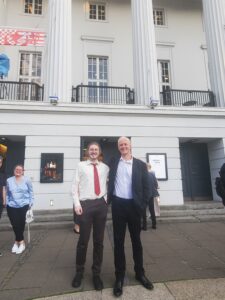Fresh from our post-production office, the GISEB 2022 video has finally arrived! 😉 Come have a look!
Music: www.Bensound.com

Fresh from our post-production office, the GISEB 2022 video has finally arrived! 😉 Come have a look!
Music: www.Bensound.com
by Nick Rickert ’23
Last week Evan and I were delighted to attend Theater Bremen’s performance of the classic German musical play “Die Dreigroschenoper” (The Threepenny Opera), written by Bertolt Brecht with music composed by Kurt Weill and first performed in Berlin in 1928. This was our first time attending a theatrical performance in Bremen. Having only read a brief synopsis of the narrative beforehand, we came to find that the production was much less of what one might expect from an opera but rather a musical supported by a modestly sized jazz ensemble (with no conductor!). I wouldn’t call myself an avid musical goer, but I was enthralled by the lively assortment of characters and fantastic music.
classic German musical play “Die Dreigroschenoper” (The Threepenny Opera), written by Bertolt Brecht with music composed by Kurt Weill and first performed in Berlin in 1928. This was our first time attending a theatrical performance in Bremen. Having only read a brief synopsis of the narrative beforehand, we came to find that the production was much less of what one might expect from an opera but rather a musical supported by a modestly sized jazz ensemble (with no conductor!). I wouldn’t call myself an avid musical goer, but I was enthralled by the lively assortment of characters and fantastic music.
Adapted from an 18th-century English ballad opera, “Die Dreigroschenoper” tells the precarious love story between the antihero Macheath (Mackie Messer), a prominent gangster, and Polly Peachum, whose father controls the beggers of London and is determined to put Macheath in prison after the two become married (not to mention tying the knot just days after meeting for the first time!). I was immersed as soon as the curtains opened silently to reveal a rugged wooden floor with a steep slope and the beggars laying in darkness.
 I was stunned by the singing voices of Polly and Macheath, whose dialogue and ballads easily stole the stage whenever they appeared. In between these moving scenes Evan and I couldn’t help but chuckle at every move of the corrupt chief of police “Tiger” who broke the fourth wall by having a short interaction with the drummer, breaking one of their cymbals. I also found it heartwarming that since it was the last performance of this production, the director bade thoughtful farewells to several cast members leaving the theater company. Later that evening I couldn’t help but hum ‘Die Moritat von Mackie Messer’ to myself.
I was stunned by the singing voices of Polly and Macheath, whose dialogue and ballads easily stole the stage whenever they appeared. In between these moving scenes Evan and I couldn’t help but chuckle at every move of the corrupt chief of police “Tiger” who broke the fourth wall by having a short interaction with the drummer, breaking one of their cymbals. I also found it heartwarming that since it was the last performance of this production, the director bade thoughtful farewells to several cast members leaving the theater company. Later that evening I couldn’t help but hum ‘Die Moritat von Mackie Messer’ to myself.
by Kathryn Baker ’23
In February of this year, I was offered a job at the University of Bremen by Dr. Thorsten Wettich. Dr. Thorsten Wettich is currently working on multiple religious projects, including the one I am helping with: The German Lutheran Identification Project. There are also two other students, besides me, from Uni Bremen that are working on this project funded by the American Academy of Religion. The Collaborative Research Grant of the American Academy of Religion is used for students from each university of the applicants in the USA and Germany to support Thorsten Wettich with the observation of German-speaking (online) worship services in the USA and interviewing one pastor and one member in the congregations.
The focus of this project is to gather more information about German Lutheran churches and services in the United States. Dr. Wettich traveled to different German Lutheran Churches all over the USA, attended services and interviewed pastors and churchgoers about what it means to be German and Lutheran. He interviewed over 35 people, and one of my jobs was to transcribe interviews and write down important notes. We have had workshops that go into detail about how to analyze data from the interviews and how to interview people. I was assigned a German Lutheran Church in the Baltimore area. I attended their online church services, interviewed the pastor of the church and then transcribed the interview. My focus was on the differences between the German Lutheran Church he preaches at, and the English-speaking Lutheran Church he also preaches at.
Overall, I have thoroughly enjoyed working on this project. I have learned many new skills including how to transcribe interviews, how to properly interview people, analyze data and coding interviews. Even though I am not being paid anymore for this job after June, I am currently still helping with the project. I will be helping with the publication of the findings and hopefully presenting this project online in the future. Even when I am back at Dickinson, I will still be working on this project!
